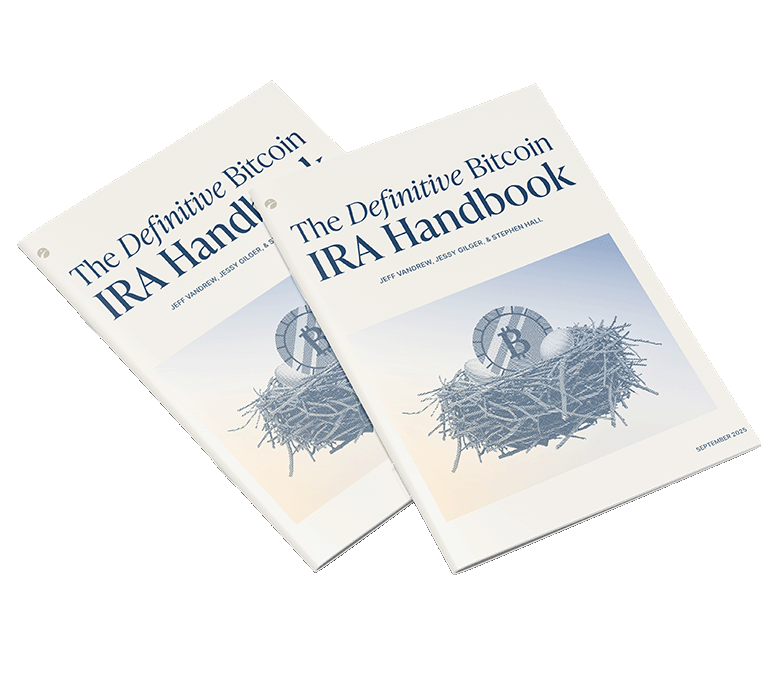
The definitive bitcoin IRA handbook


Holding bitcoin in an IRA is something we recommend to clients for its massive tax advantages, and we believe it’s as sustainable as can be under current tax law. But what about bitcoin mining in an IRA? You may, like many Unchained clients, wonder if doing so is beneficial or even permissible. At Unchained, we don’t allow clients to engage in bitcoin mining within their Unchained IRA because mining within an IRA can have adverse tax consequences.
Before discussing mining within an IRA, it’s important first to understand the tax consequences of regular bitcoin mining in the U.S. If a taxpayer obtains bitcoin through mining, they must recognize income in the amount of the fair market value in U.S. dollar terms of the bitcoin received on the date of receipt. That recognized income is subject to income tax at ordinary income tax rates.
On top of income tax, the taxpayer may also be subject to self-employment tax. Self-employment tax is how people earning income outside of an employer-employee relationship contribute to Social Security and Medicare. Self-employment tax would be imposed if the underlying mining activities rise to the level of a “trade of business.” This is a subjective standard, and the IRS does not provide any guidelines on the topic specific to mining. For additional information, you may wish to consult IRS Notice 2014-21.
On first glance, mining within an IRA appears very attractive. As explained above, mining generates a lot of income, and that income is taxed at ordinary rates (as opposed to lower capital gains rates). On top of that income tax, self-employment tax may apply. Mining within an IRA would eliminate all of these tax consequences.
The Internal Revenue Code (IRC) does not list which types of investments are allowed within retirement accounts. In this regard, it is a negative statute; it instead lists investments that are not allowed within a retirement account. Any investment that is not prohibited is therefore allowed. There is no specific prohibition on investing in a mining operation within the Code, so technically, it is possible to mine bitcoin in an IRA.
The question you should ask is not whether it’s possible to mine bitcoin in an IRA, but whether it’s prudent given current tax law and the risks involved. To weigh these factors properly, you need to consider unrelated business income tax or UBIT.
Unrelated business income tax is a special tax imposed by section 511 of the Internal Revenue Code on otherwise tax-exempt charities and other nonprofits when they engage in “trade or business” activities. The idea behind UBIT tax is this: if a nonprofit engages in business activity, it shouldn’t gain an inherent advantage over its for-profit competitors.
It may seem strange to worry about a statute designed to tax charities and nonprofits. However, IRC 408(e)(1) states that for UBIT purposes, an IRA is treated the same as a charity. This is due to worries that IRAs, being tax-exempt in the same way charities and nonprofits are tax-exempt, could also gain an unfair competitive advantage over for-profit competitors.
Certain types of income are never deemed to be from “trade or business” activities, namely interest, dividends, capital gains, royalties, and (most) rental income from real estate. Outside of those safe harbors, what constitutes a “trade or business” activity is a subjective standard.
However, according to Treas. Reg. 1.513-1(b), “the term trade or business has the same meaning it has in section 162, and generally includes any activity carried on for the production of income from the sale of goods or performance of services.” “Section 162” is section 162 of the Internal Revenue Code, which defines which types of activities are eligible to take business deductions against income.
Outside of the IRA context, miners regularly deduct their business expenses (such as electricity and equipment costs) against their mining income. As a result, under Treas. Reg. 1.513-1(b), it stands to reason that mining is a “trade or business” activity that would generate Unrelated Business Income Tax within an IRA.
Historically, simply buying and holding bitcoin has yielded exponential returns. The tax risks involved in mining in an IRA do not seem worth it compared with those historical buy-and-hold returns, so with our Unchained IRA product, we’re maintaining a singular focus on buying and holding bitcoin.
This article is provided for educational purposes only, and cannot be relied upon as tax, legal, or investment advice. Unchained makes no representations regarding the tax consequences of any transaction described herein, and all such questions should be directed to an attorney or CPA of your choice. Unchained further makes no representations as to the fitness of any investment described herein. Please consult an investment professional for investment advice.